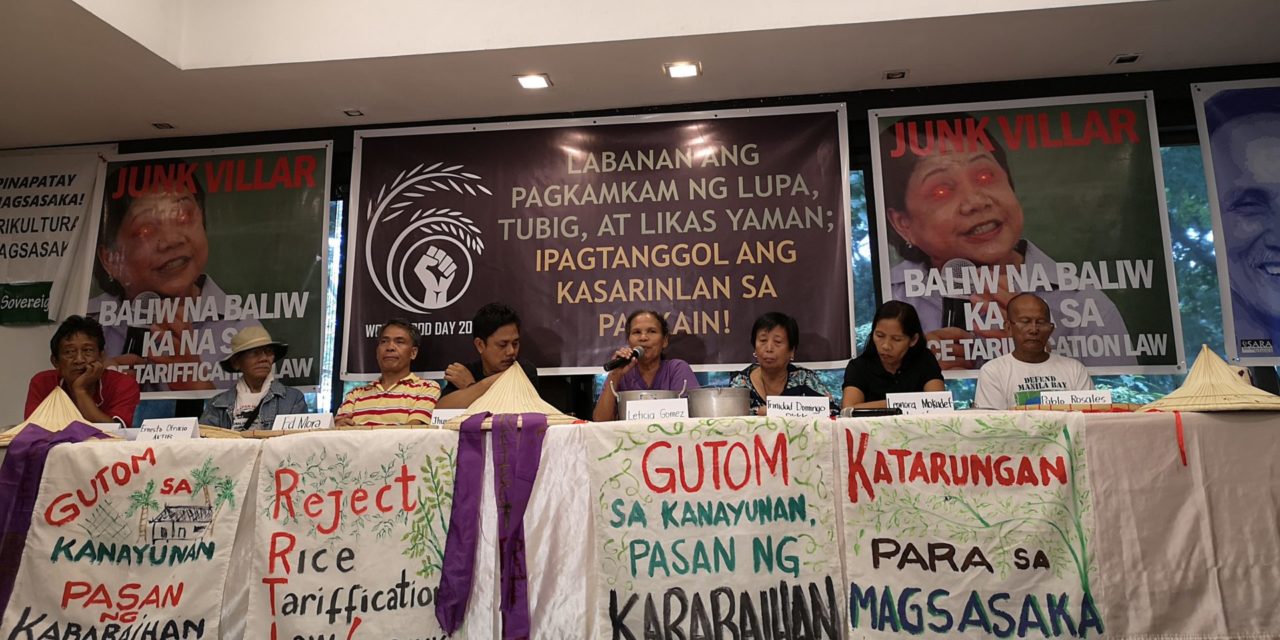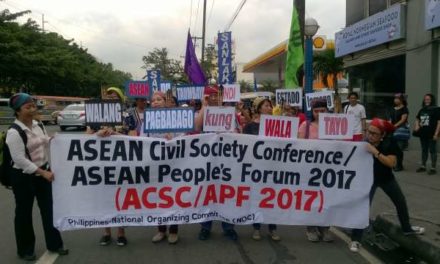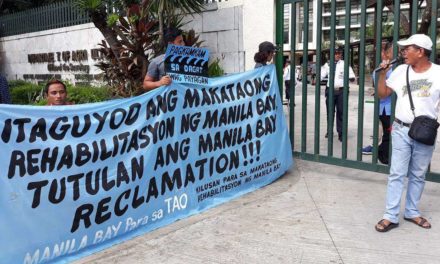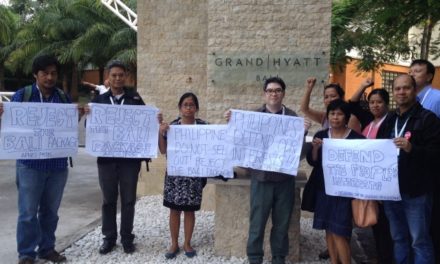Statement on the World Food Day, 2019 October 15
We are in the midst of a food crisis. This is a systemic problem born out of the continuing push for corporate-driven neoliberal policies that have allowed large corporations and foreign investors to dominate local food-producing industries, and to capture natural resources and human potential in their pursuit of greater wealth and power. Contrary to the Duterte administration’s claims that these measures would solve poverty, hunger and the environmental crisis, and encourage economic growth, these policies have instead precipitated a severe crisis in food, land, fisheries, livelihoods, and natural resources. The most gravely affected are local farmers, artisanal fisherfolk, indigenous peoples, women, and workers who produce most of the country’s food needs.
The Rice Trade Liberalization (RTL) Law has completely opened up the rice industry and removed the regulatory functions of the National Food Authority (NFA) over rice importation. In doing so, it has opened the door wide for the big businesses to dominate the rice importation industry and ship in massive amounts of imported rice. As opposed to the promises of Cynthia Villar and other proponents of the law, this has resulted in higher rice prices for consumers who used to rely on NFA rice (priced at ₱27 per kilogram) but lower selling prices of palay for rice farmers.
The reclamation of Manila Bay continues to be advanced by the government under the banner of rehabilitation and environmental conservation. Part of the plan is to relocate almost 200,000 families living along the bay to areas that are far from their source of livelihood. Despite this, the communities are not provided with spaces for meaningful engagement. Furthermore, amid the government’s rehabilitation efforts, plans for massive reclamation projects are also being forwarded by large corporations and local governments, thus raising doubts on the real intentions of the rehabilitation plan.
Large-scale investments encroaching on ancestral domains in the name of “economic growth” are being pushed more relentlessly. The mining industry—which continues to proliferate largely owing to the Mining Act of 1995—has significantly damaged the environment, compromised the health of numerous communities, destroyed livelihoods, subverted cultures, and displaced thousands of people. In other industries, projects with the same destructive impacts are also being pushed. The Kaliwa Dam is being promoted as a solution to Metro Manila’s water crisis, yet it comes with grave social and environmental costs. Stretching for 27 kilometers from the boundary of Infanta and General Nakar in Quezon province to Teresa and Antipolo in Rizal province, the construction of the dam would inevitably have a significant carbon footprint. It would also displace 150,000 people, most of whom are from the Dumagat-Remontado indigenous communities.
Within the context of a patriarchal capitalist society, rural and indigenous women in small-scale food production have been the most disadvantaged by the corporate capture of the food system. They have suffered from exclusion from modern contract-farming arrangements and unjust compensation for their work under such schemes; limited employment in industrial farms and aquaculture due to heavy mechanization; limited access to markets; and unequal access to land and other productive resources, technology, finance, education, and other relevant services. Furthermore, because they are frequently overburdened with both agricultural and domestic work, women food producers have often had limited participation in decision-making on economic and political matters even within grassroots movements.
But while the government is becoming more aggressive in pushing for its neoliberal economic agenda, it has also deliberately stymied the enactment and implementation of policies and measures that would have advanced small-scale food providers’ economic, social, and cultural rights. These include the distribution of agricultural lands under the Comprehensive Agrarian Reform Program, the enactment of a law that would allow for the management and utilization of the coco levy fund in favor of coconut farmers, the delineation and the issuance of Certificate of Ancestral Domain Titles, and the enactment of a National Land Use Act and the Alternative Minerals Management Bill.
As such, it is clear that the Duterte government—similar to previous administrations—continues to prioritize the interests of large corporations and foreign investors at the expense of the rights of the people who feed the nation. Under Duterte’s authoritarian and pro-capitalist regime, the deepening collusion between the government and big businesses as well as the shrinking civil society space have aggravated the climate of impunity. Those who challenge the government’s neoliberal policies, stand up against abusive corporations and state actors and institutions, and promote human rights and the protection and preservation of the environment are harassed, criminalized, and killed.
Today, as we commemorate World Food Day, grassroots movements together with civil society organizations are coming together to strongly condemn the Duterte administration’s aggressive neoliberal policies and projects which are destroying livelihoods, cultures, and the environment as well as its authoritarian governance which is undermining democracy and shrinking the space for civil society. The following outlines our 8-point demand:
- RECOGNIZE AND RESPECT peoples’ right to healthy and culturally appropriate food produced through ecologically sound and sustainable methods and right to determine their own food systems and policies without any interference from corporations and governments;
- RECOGNIZE land, water, forests, and other natural resources as commons, the sources of life and livelihood of all peoples and communities—not as capital that can be privately owned;
- RECOGNIZE and RESPECT women’s roles and rights in food production and ENSURE their representation in all decision-making bodies;
- REPEAL the Rice Trade Liberalization Law and ENACT a pro-farmer coco levy law;
- HASTEN the resolution of agrarian cases as well as the process of coverage and distribution of agrarian lands and FINISH land acquisition and distribution backlogs by 2022;
- RECOGNIZE the ancestral domains of indigenous peoples, RESPECT and SUPPORT their right to self-determination, and STOP state- and corporate-sponsored infrastructure projects such as the Kaliwa Dam, extractive industries such as large-scale mining, and investments that are encroaching on ancestral domains and restricting or obstructing access to the commons;
- STOP the extensive reclamation and corporate capture of Manila Bay and RECOGNIZE coastal communities along Manila Bay as key stakeholders in the rehabilitation efforts; and
- END the assault and killing of peasants, farmers, fisherfolk, indigenous peoples, and defenders of human rights and the environment; COME UP with stronger measures to protect farmers, fishers, and indigenous peoples from harassment and violence; and ESTABLISH safeguards that protect them from land and water grabbing, cancellation of land titles and other forms of reversals, conversions, and reclamation.
We call on farmers, fishers, indigenous peoples, women, workers, and social movements to resist neoliberal policies and authoritarian rule that are clinching corporate control over land, water, forests, and other natural resources; threatening peoples’ rights including the right to food; and aggravating poverty and hunger. We also enjoin these groups to advance alternative visions and practices of food production and provision that are people-centered and ecologically sustainable.
We shall continue to mobilize at local and national levels in the days and months to come to raise the issue of the food crisis and the assault on our small-scale food providers. We shall struggle to push back on policies and projects that threaten the rights of peoples and small-scale food providers and undermine our food sovereignty. #
WORLD FOOD DAY COLLECTIVE
Contact: Bianca Martinez, Focus on the Global South (+639454381895 / [email protected])






![[IN PHOTOS] In Defense of Human Rights and Dignity Movement (iDEFEND) Mobilization on the fourth State of the Nation Address (SONA) of Ferdinand Marcos, Jr.](https://focusweb.org/wp-content/uploads/2025/07/1-150x150.jpg)



